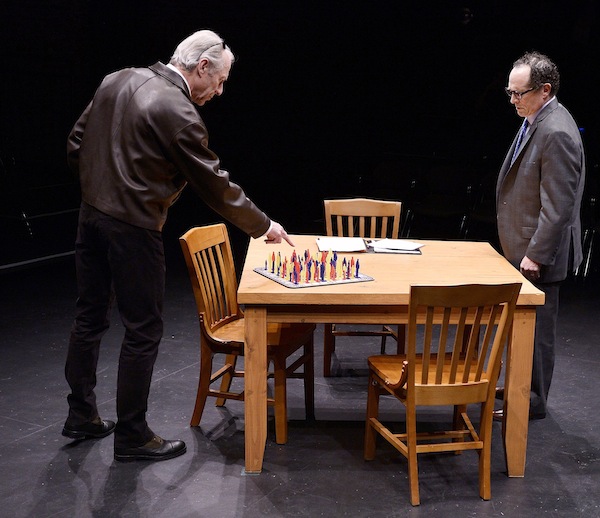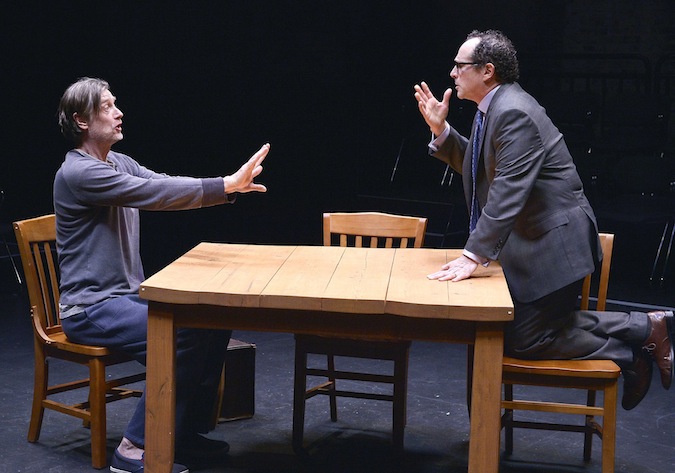Theater Review: “Ulysses On Bottles” — Floating More Questions Than Answers
Tragedy isn’t when evil triumphs, but when good becomes entangled in its own inevitable contradictions.

Will Lyman and Jeremiah Kissel in Arts Emerson/Israel Stage’s “Ulysses On Bottles.” Photo: Paul Marotta.
By Ian Thal
Ulysses On Bottles by Gilad Evron. Translated by Evan Fallenberg. Directed by Guy Ben-Aharon. Presented by Israeli Stage and Arts Emerson at the Paramount Center, Boston, MA, through April 26.
Roughly two and a half years ago, while reviewing a staged reading of Gilad Evron’s Ulysses On Bottles at Boston’s Goethe Institut, I was so impressed by the script that I advocated that Israeli Stage give the play a full production. Artistic director Guy Ben-Aharon has done so, and I am happy if I contributed in some way to helping things along.
Ulysses (Ken Cheeseman) is a secular Israeli-Arab captured while attempting to sail a raft made of plastic bottles to Gaza. What confounds the captors of this former teacher is his cargo: Russian literature. The quixotic Ulysses wants to break the Israeli naval blockade of Hamas-ruled territory because he is convinced that Gazans need the “expansiveness” of Russian literature. His attorney, Saul Izakov (Jeremiah Kissel) understands his client, however eccentric, to be of no harm to anyone, and hopes to demonstrate that Ulysses’ idealism should be granted the court’s mercy.
Izakov’s other client is a department at the Ministry of Defense, which is charged with regulating everything imported into Gaza over the Israeli border. The department’s head, Seinfeld (Will Lyman) wants a review of his department’s policies to ensure that they comply with international human rights law. However, he understands that the situation is ultimately untenable and, even with the strictest adherence to the law, a war he does not want to fight is inevitable (tellingly, there have been multiple outbreaks of fighting between Hamas fighters and the IDF since the play premiered in 2011.) Ultimately, even after assuring Seinfeld that his policies are legal, Izakov feels that his client’s conscience is not clear. “You’re not looking for legal counsel,” he finally says,”[…] You’re looking for God.”
Meanwhile, Izakov’s philanthropist wife, Eden (Karen MacDonald) demands that Saul drop his serious demeanor do a seemingly frivolous and non-sensical act of kindness – a song and dance routine at a charity gala for disabled children.
Izakov’s mercenary double is Horesh (Daniel Berger-Jones), a young and talented lawyer in his firm who is lobbying to be made a senior partner. Whereas every other character in the play is driven at some level by a moral impetus, Horesh is completely about the money – he brings in half the firm’s earnings in part by defending the notorious crime family he grew up with. He has no concern about the clan’s guilt or innocence and could care less if he is making the world a better place. Beset by irreconcilable moral demands, Izakov yearns for a clear path to the just life and it is this desire that lies at the tragic heart of Ulysses on Bottles. Tragedy isn’t when evil triumphs, but when good becomes entangled in its own inevitable contradictions.
Guy Ben-Aharon’s directorial skills, only suggested in his staged readings for Israeli Stage (and other reading series he directs) , are here finally on full splendid display. He has staged the play in-the-round, a particularly challenging choice given that it means that some of the performers inevitably have their backs turned to a segment of the audience; yet the movements of the actors on and off stage and around the wooden table at its the center seem effortless.
Ben-Aharon also keeps the design elements to the minimum, but this is not for the sake of an abstract minimalism but to keep the audience focused on important dramatic details. Costume designer Charles Schoonmaker dresses the characters very cleverly: Eden is wrapped in a loose fitting yellow and blue print top that evokes the cities and coastlines of both Israel and Gaza (it’s decorated by butterflies that can ignore borders). Izakov and Horesh are both outfitted in the customary suit and tie of the legal profession: the contrast is dramatically stark, whereas Izakov is content with a simple blue suit, Horesh’s obsession with hi-flier status means flashier colors and a custom-tailored fit for him (Berger-Jones’ hair and beard are also meticulously trimmed). Likewise, though the props are few, Ron De Marco’s design for Seinfeld’s table top demographic map of Gaza is effective: it is humorous, but sets out the moral quandary the government official grapples with daily. Scott Pinkney’s lighting design references Ulysses’ raft with small hanging elements inside of plastic bottles. Ulysses’s lonely monologue is lit via a chiaroscuro of red and black. Dave Remedios’ sound design is well balanced in every corner of the room (absolutely necessary given the staging), and the score sounds like percussion mallets striking bottles and fingertips stroking a glass harp.

Ken Cheeseman and Jeremiah Kissel in Arts Emerson/Israel Stage’s “Ulysses On Bottles.” Photo: Paul Marotta.
Three of the actors from the 2012 reading returned for this production, and their performances have grown richer and deeper. Lyman’s Seinfeld is not merely an intelligent and cultured man who makes the hard moral choices in the ultra-rough neighborhood that is the Middle East – in a flash he can erupt with rage that his hand may be forced to take a life rather than save a life. Likewise, MacDonald’s Eden retains the character’s air of frivolity (the would-be impresario who wants to dress her husband up like a doll), yet she is more than ready to defend the seriousness of her generosity against fools who doubt her, even though her own moral blindspot is revealed at the end. Kissel’s Izakov retains the perfect timing of a straight man, which he uses to deal with Eden’s showiness and Ulysses’ romanticism, but in this production he turns the figure into a besieged hero who cannot repair the broken world he lives in. That added dimension only adds poignancy to the comic highlight of the show: when he relents and performs “Que Sera Sera.” In the 2012 reading Johnny Lee Davenport played Ulysses with a larger-than-life, grandiosity; in contrast, Cheeseman supplies a Ulysses who is a life-sized beatnik, a vulnerable luftmensch who often takes a cantilevered stance on the stage, as if he was a ballet dancer fighting gravity. Berger-Jones’ performance as the self-consciously slick Horesh is showbiz smart: his go-getter puts on a show for the audience of putting on a show for the Izakovs.
Both Ben-Aharon and associate producer Molly Tobin reported that opening night audience members on the Left and Right engaged in a post-show shouting match. Given that a liberal zionist like Ari Roth was recently driven from his post as the critically acclaimed artistic director of Washington D.C.’s Theater J for daring to present a multifaceted portrait of Israel, one might guess that some on the Right saw this as an opportunity to exercise some muscle. Meanwhile, no doubt some on the Left were disappointed they did not see an example of the demagoguery of Caryl Churchill’s Seven Jewish Children. (Ben-Aharon joked afterwards that “the Left left.”) Neither group was going to find ideological satisfaction because Ulysses On Bottles does not spoon-feed easy answers to simple questions but does what first-rate theater is supposed to do — egg us on to deeper questioning.
Ian Thal is a playwright, performer and theater educator specializing in mime, commedia dell’arte, and puppetry, and has been known to act on Boston area stages from time to time, sometimes with Teatro delle Maschere. Two of his short plays appeared in theater festivals this past summer. He has performed his one-man show, Arlecchino Am Ravenous, in numerous venues in Massachusetts and Rhode Island. One of his as-of-yet unproduced full-length plays was picketed by a Hamas supporter during a staged reading. He is looking for a home for his latest play, The Conversos of Venice, which is a thematic deconstruction of Shakespeare’s The Merchant of Venice. Formerly the community editor at The Jewish Advocate, he blogs irregularly at the unimaginatively entitled From The Journals of Ian Thal, and writes the “Nothing But Trouble” column for The Clyde Fitch Report.
Tagged: Arts Emerson, Gilad Evron, Guy Ben-Aharon, Israeli Stage, Jeremiah Kissel, Karen MacDonald, Ulysses on Bottles


Where can I get a copy of the play: Ulysses on Bottles?
In the days leading up to and since the anniversary of the October 7, 2023 Hamas-led attack on Southern Israel that caused the current war, I have been thinking about this play again, and wonder if remounted today, it would play differently than when I reviewed it in 2015 or even when I first encountered it in 2012.
The play’s Defense Ministry official, Seinfeld’s description of what he is protecting Israeli society comes off less as a frightening possibility, but a prophecy of what happened last year, and it leaves the titular Ulysses’ mission even more Quixotic.